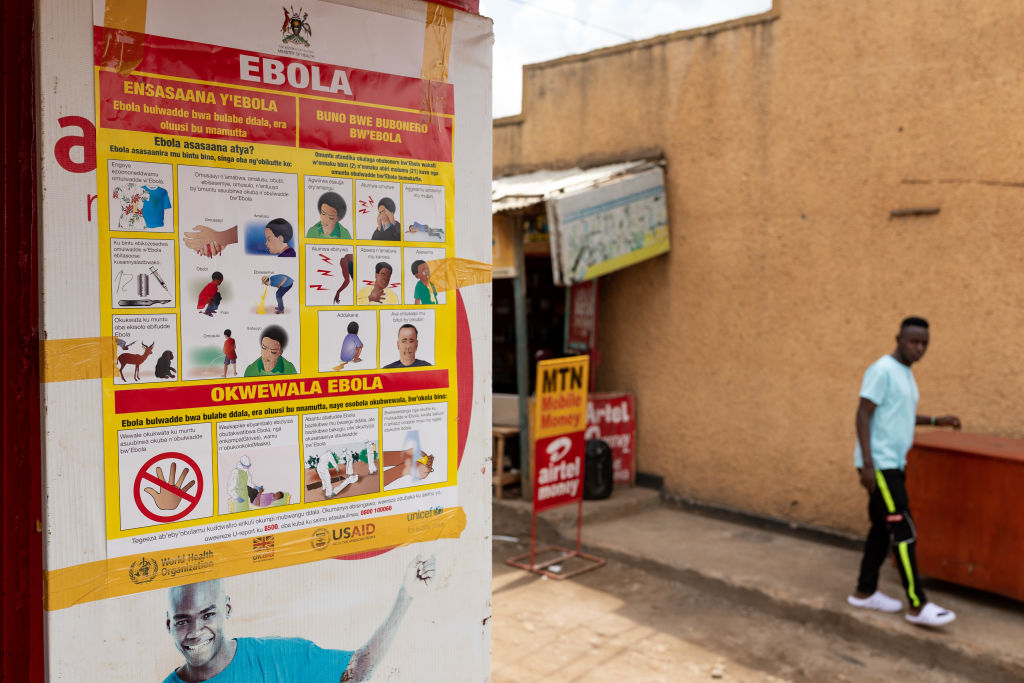Ebola outbreak leads to 3-week lockdown in two Ugandan districts


A free daily email with the biggest news stories of the day – and the best features from TheWeek.com
You are now subscribed
Your newsletter sign-up was successful
Ugandan President Yoweri Museveni announced an immediate three-week lockdown in two districts as Ebola infections begin to rise again. The announcement on Saturday halted movement in and out of the Mubende and Kassanda districts, aside from cargo trucks, and imposed a curfew, CNN reports.
The latest outbreak was officially declared on Sept. 20 and has infected at least 58 people with 19 reported deaths, reports NPR. Authorities were reportedly not quick to recognize the outbreak which started in a farming community, calling it a "strange illness" back in August.
Museveni had originally spoken against a lockdown, arguing that the virus wasn't airborne like COVID-19 and therefore did not require the same stringent measures, BBC reports. However, due to the slow recognition of the disease, many of those infected left their hotspots trying to seek care elsewhere, leading to over 1,100 contacts of known Ebola patients.
The Week
Escape your echo chamber. Get the facts behind the news, plus analysis from multiple perspectives.

Sign up for The Week's Free Newsletters
From our morning news briefing to a weekly Good News Newsletter, get the best of The Week delivered directly to your inbox.
From our morning news briefing to a weekly Good News Newsletter, get the best of The Week delivered directly to your inbox.
The outbreak has also caused concern in the United States. Beginning on Oct. 6, all U.S.-bound passengers coming from Uganda were rerouted to just five airports where they were checked for symptoms, reports the Los Angeles Times. Currently, Ebola has no cure or vaccine. It is spread through bodily fluid contact and can cause fever, vomiting, diarrhea, muscle pain, and internal and external bleeding, NPR explains.
This is Uganda's fourth Ebola outbreak. "These are temporary measures to control the spread," Museveni said in a televised address. "We should all cooperate with authorities so we bring this outbreak to an end in the shortest possible time."
A free daily email with the biggest news stories of the day – and the best features from TheWeek.com
Devika Rao has worked as a staff writer at The Week since 2022, covering science, the environment, climate and business. She previously worked as a policy associate for a nonprofit organization advocating for environmental action from a business perspective.
-
 Scientists are worried about amoebas
Scientists are worried about amoebasUnder the radar Small and very mighty
-
 A Nipah virus outbreak in India has brought back Covid-era surveillance
A Nipah virus outbreak in India has brought back Covid-era surveillanceUnder the radar The disease can spread through animals and humans
-
 Trump HHS slashes advised child vaccinations
Trump HHS slashes advised child vaccinationsSpeed Read In a widely condemned move, the CDC will now recommend that children get vaccinated against 11 communicable diseases, not 17
-
 Deaths of children under 5 have gone up for the first time this century
Deaths of children under 5 have gone up for the first time this centuryUnder the radar Poor funding is the culprit
-
 A fentanyl vaccine may be on the horizon
A fentanyl vaccine may be on the horizonUnder the radar Taking a serious jab at the opioid epidemic
-
 Health: Will Kennedy dismantle U.S. immunization policy?
Health: Will Kennedy dismantle U.S. immunization policy?Feature ‘America’s vaccine playbook is being rewritten by people who don’t believe in them’
-
 Stopping GLP-1s raises complicated questions for pregnancy
Stopping GLP-1s raises complicated questions for pregnancyThe Explainer Stopping the medication could be risky during pregnancy, but there is more to the story to be uncovered
-
 More adults are dying before the age of 65
More adults are dying before the age of 65Under the radar The phenomenon is more pronounced in Black and low-income populations



